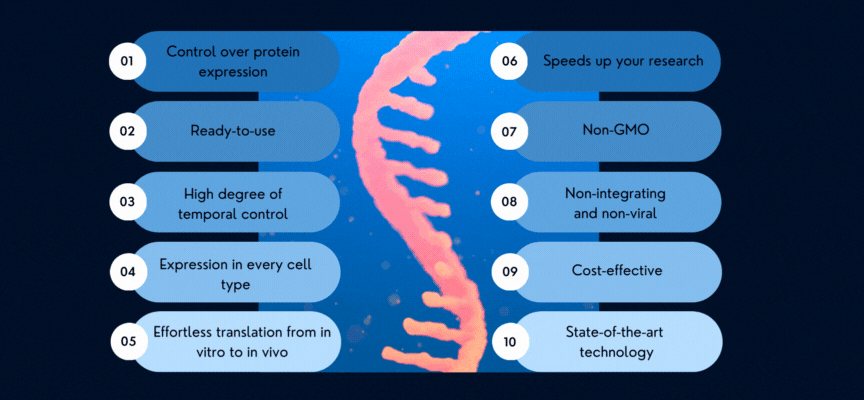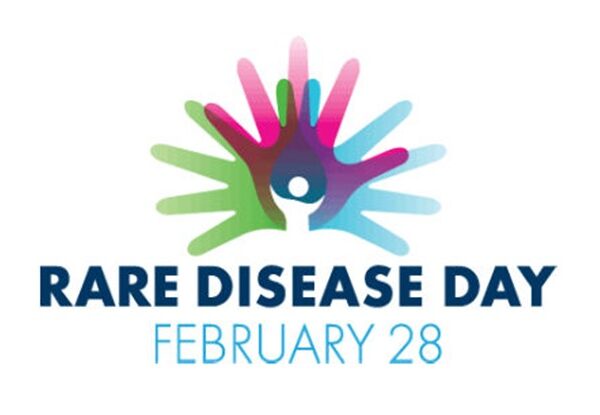1. mRNA allows for unprecedented control over protein expression
Where plasmid-induced protein expression is often an all-or-nothing situation that can only be marginally controlled by turning protein expression on or off via inducible promoters, mRNA-induced protein expression can be finetuned to a high degree.
This is because of 2 reasons: 1) mRNA transfection is, unlike DNA, cell-cycle independent, allowing a linear correlation between mRNA dose and mRNA uptake in the cell. 2) mRNA is directly translated into protein, whereas DNA is first transcribed in mRNA, before it is translated. This amplification step is often beneficial for detection, but also highly variable. A bit more DNA into the cell results in massive increases in protein expression. The amount of mRNA, on the other hand, correlates linearly to protein expression over 5 orders of magnitude, both in vitro and in vivo. In other words, transfection with twice the amount of mRNA means twice the amount of protein providing you with control over protein expression levels hither before unseen. Curious to know the details? Check out this paper by the founders of RIBOPRO.
2. mRNA is ready-to-use, no cloning required
Nearly any researcher familiar with DNA techniques knows the sometimes madness-inducing frustration of cloning. Compound this with the added hassle of producing virus if you want reliable transduction of your plasmid in cells and we can clearly see why DNA vector production can be highly labour-intensive and frustrating.
The great benefit of mRNA is that everything comes in an easy transfection-ready solution, that can be used out-of-the box. Meaning that you can spent your valuable time on your research instead on performing laborious preparations.
3. mRNA allows for a high degree of temporal control in protein expression
Being a transient molecule by nature, mRNA allows for great amounts of temporal control. Needing to cross only the plasma-membrane, expression with mRNA is rapid (reaching detectable protein within hours) and mRNA degradation follows predictable exponential patterns.
Based on the cell-type and mRNA sequence, protein expression kinetics can be accurately determined, both in vitro and in vivo. This in turn allows for great temporal control of protein expression, which is difficult to achieve with plasmids. (Even with inducible promoters which tend to be leaky and allow for some transient protein expression).
mRNA stability and protein expression kinetics can easily be altered by (3’)UTR optimization, A-tail length modification, and the use of repeated transfections. Thereby always keeping you in control of your protein expression.
4. mRNA makes it possible to express proteins in hard-to-transfect cells
For DNA vectors to be transcribed into mRNA and then translated into a protein, the DNA of interest needs to overcome two barriers, the plasma membrane and the nucleus. Hampered by the relatively large size of the plasmid, DNA transfection often relies on the nucleus dissolving during cell-cycling. If the cell population is slow to divide or terminally differentiated, protein expression will be subpar.
For most immortalized cell lines this is not a problem. However, anything more exotic like primary cells tend to be incredibly difficult to transfect with plasmids. Of course, you can package your plasmid in a virus or try and make a stable cell line. However, both techniques are time-consuming and require specialized knowledge and equipment.
mRNA is much smaller (containing only the gene of interest and UTRs), only need to pass the plasma membrane, and can immediately be translated once they enter the cytosol. mRNA therefore allows you to achieve protein expression in any cell type.
5. mRNA makes it possible to express your protein of choice in vivo irrespective of sequence
Most studies requiring protein expression are done in vitro with plasmids, after which the experiments stops. This is a shame, since animal models can be used to investigate protein function in vivo by performing, for example, knockout studies. However, inducing protein expression in an animal model is rarely a possibility due to technical, financial, and time constraints. These models also frequently do not accurately represent the (patho)physiological situation.
mRNA is fast to produce, robust, and can be formulated into lipid nanoparticles for transfection in any tissue in any animal model. With the possibility to induce protein expression in animal models in a short time-frame, it becomes possible to study, for example, patient mutations or develop mRNA-based therapeutics.
6. Using mRNA speeds up your research
Using mRNA can seriously speed up your research. mRNA is synthesized in a matter of days, from DNA templates that can be synthesized in weeks, after which you can immediately use it in your experiments. As shown with the Covid-19 vaccines, mRNA is relatively robust, regardless of sequence, and requires way fewer optimization and characterization than virus or protein production. Making the journey from cells to animal model to patient much faster.
7. mRNA is a non-GMO agent
Depending on your research question this can be crucial. If you are developing a clinical therapeutic, or perform research that ultimately shows potential in the clinic, having a non-GMO agent is incredibly beneficial by preventing delays due to regulatory hurdles. In addition, mRNA can be used in virtually any laboratory, avoiding the need for costly investments in equipment and infrastructure for GMO-work.
8. mRNA is non-integrating and non-viral, allowing for safe application and optimization of genetic therapies
One of the benefits of a transient therapeutics like mRNA is the reversibility of side-effects, allowing optimizations to treatment conditions along the way. In contrast, DNA-based gene therapies, for example, require 100% accuracy, as you cannot reverse the treatment or tweak it in a second try. mRNA does allow for multiple tries, where you can perform controlled dose testing and check for side-effect. Bringing personalized gene therapy from a dream to reality.
9. mRNA is not as expensive as you think
A common reason why researchers are hesitant to use mRNA are the costs. Sure, on the surface, mRNA looks like a more costly option than a DNA construct, especially if you are accustomed to clone it yourself. However, what often is not taken into account is the amount of time and labour these processes take. As discussed before, mRNA can seriously speed up your research, easily making up for the initial costs by saving you precious time. Furthermore, mRNA allows you to answer research questions and develop therapeutics that were unattainable or extremely difficult before, paying back any upfront costs with great dividend in the form of high impact papers and novel therapies.
10. mRNA is hot and you should make use of that fact
After the success of the mRNA vaccines, mRNA has been proven to be a powerful tool for research and drug development. Using this novel technology will certainly boost your grant application or funding round.
If one or more of these reasons piqued your interest in mRNA, then please visit our website for more information or contact us via email, phone or book a meeting to discuss how RIBOPRO can make your mRNA dreams come true.




